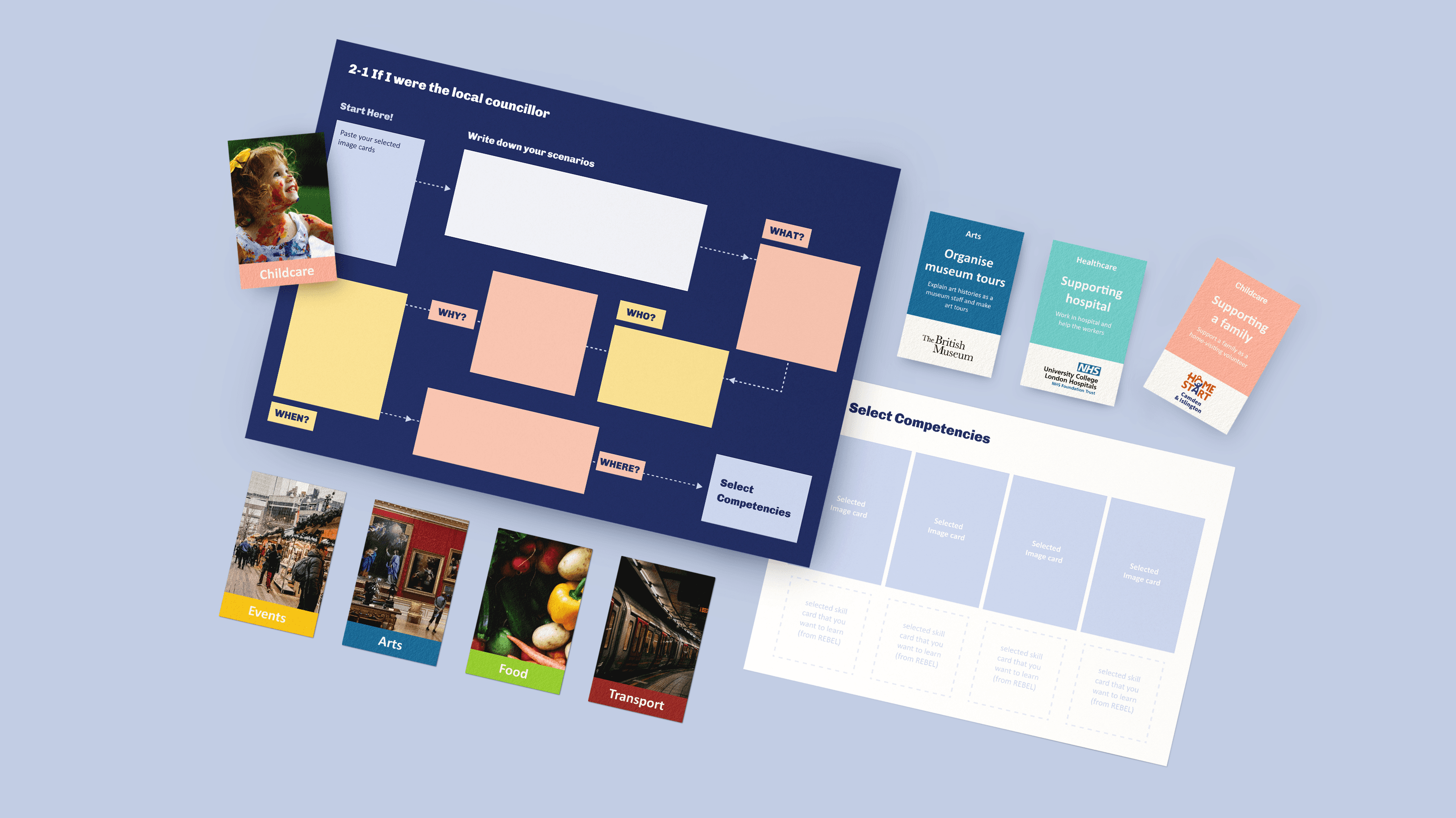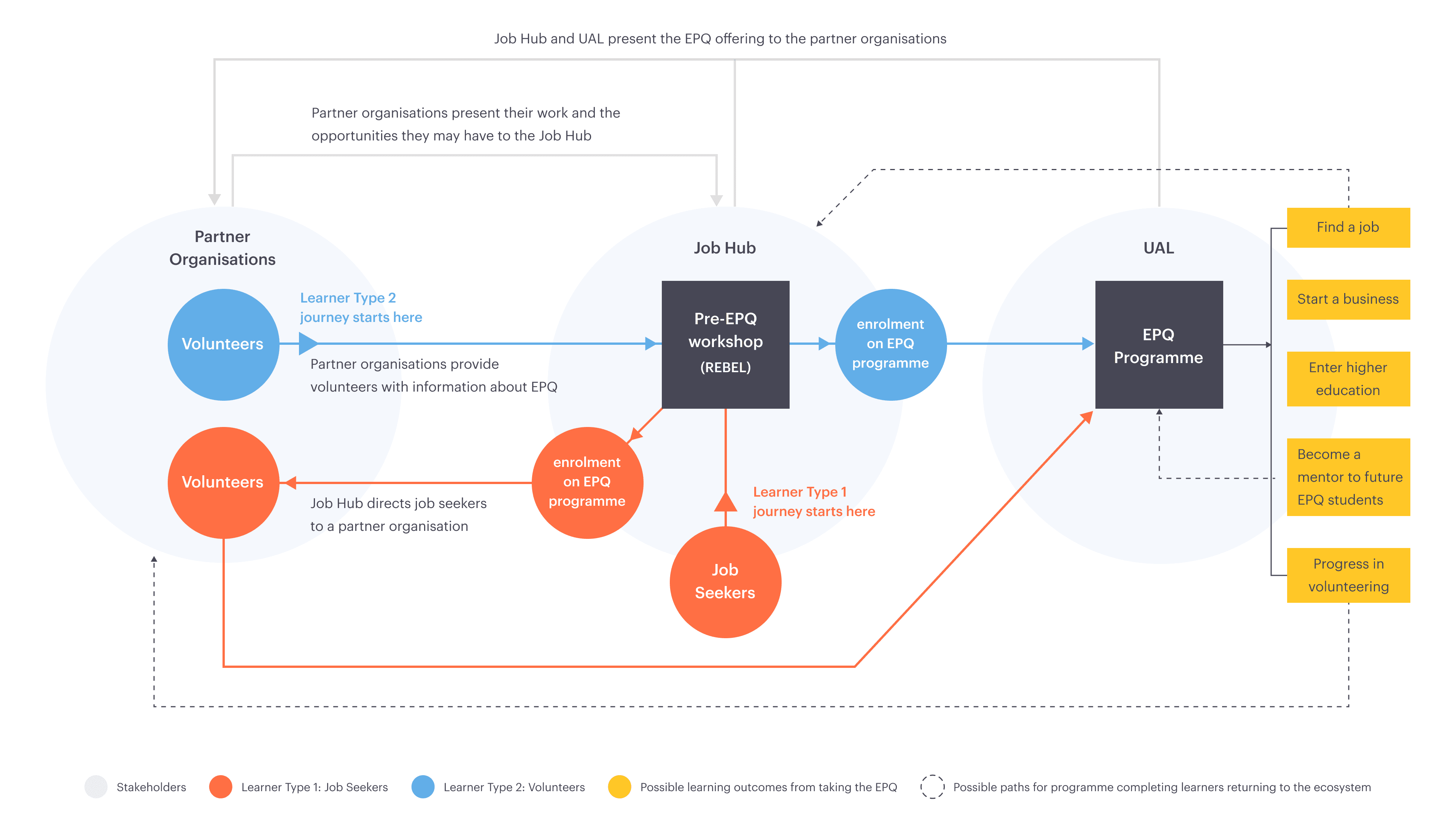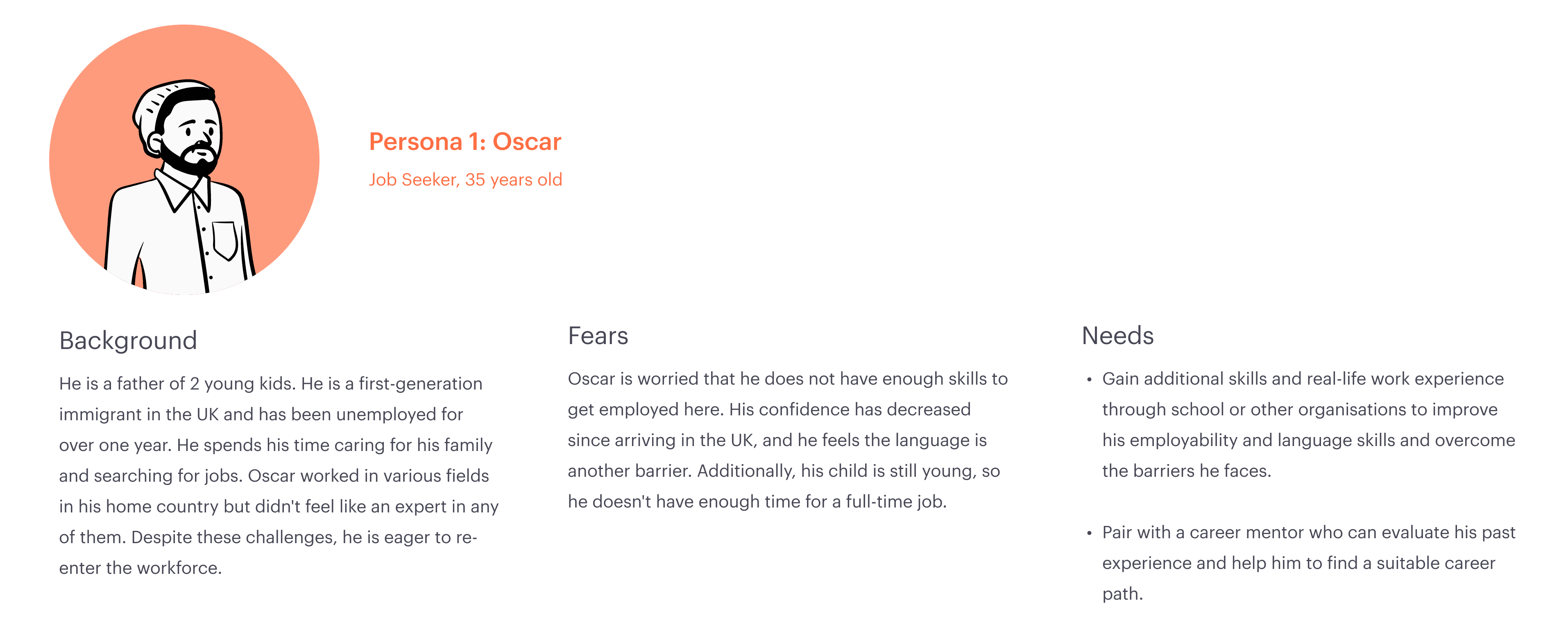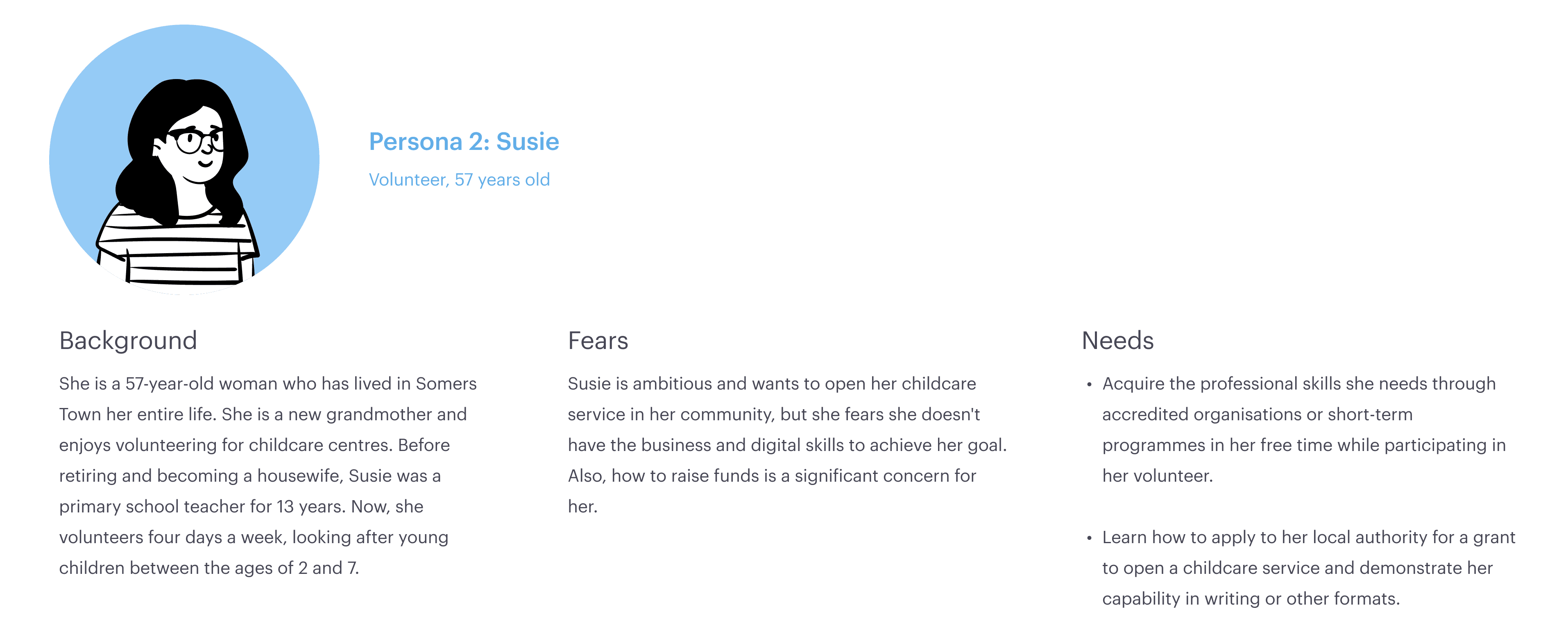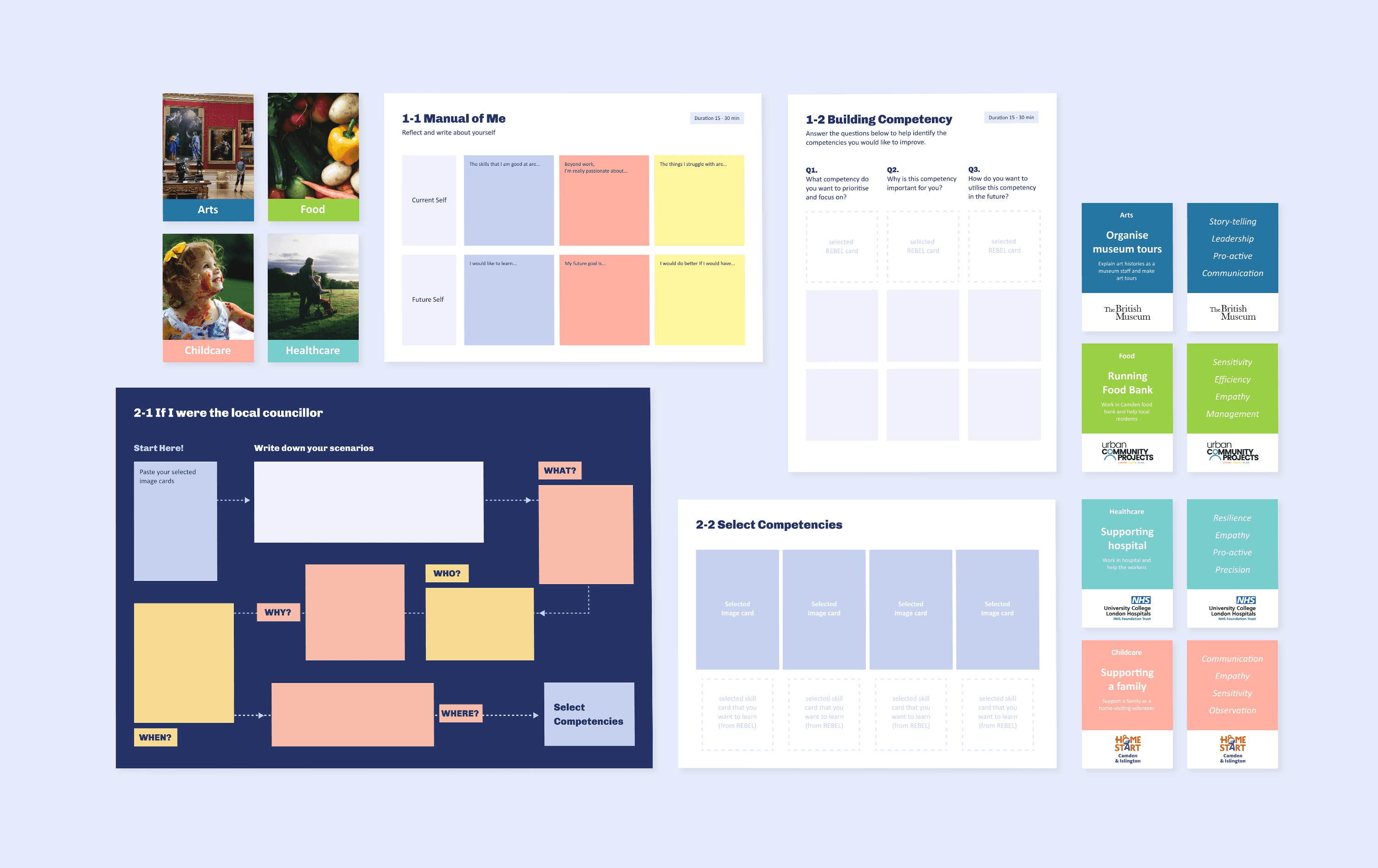Overview
Connecting Growth is a service that enables participants to progress in their careers by combining volunteering work with a learning qualification (EPQ), which builds on the existing ecosystem within Camden Community.
By providing the EPQ within a reflective learning structure, attached to a real work experience opportunity through volunteering, participants can gain new skills, immerse themselves within their fields of interest and eventually help achieve their personal goals.
My Role
Service Design, User Research, Workshop Facilitation, Prototyping and Testing, Visual Design
Challenge
To find a way to give external recognition for social action and to help social actors articulate their existing skills and improve their professional prospects.
Social action in the London Borough of Camden has a long history, including informal and grassroots volunteering, citizen advice, and community championing. Previous efforts by MA Service Design students identified a prevalent issue among social actors, with a majority feeling that their profession lacks societal respect and encountering barriers to professional advancement.
This project explored how a design-led EPQ (Extended Project Qualification) might offer tools for social action in Somers Town, aiming to create a skills curriculum and qualification pathway for residents involved in social action initiatives.
Process
The project was developed in collaboration with one of our primary partners, the Job Hub, led by the Somers Town Community Association. This organisation assists clients in securing employment or enhancing their career opportunities.
Multiple interviews with staff and observations at service sites allowed us to become familiar with Job Hub's customer base. Then, to further identify our potential learners, we and the other two groups ran a workshop introducing EPQ to interested people and understanding their needs and barriers through self-reflection activities. The following three types of potential learners were identified in the end.
Approach
Before seeking new design solutions, we look for what is already working at the community level.
Mapping all the services provided by the Job Hub led to the discovery of the strong partnerships already established with numerous community organisations. Many Job Hub clients start by volunteering to develop experience, skills, and confidence.
After conversing with the CEO of one of these organisations, we acquired a crucial insight: the EPQ programme and volunteering would mutually benefit each other. The EPQ programme could provide opportunities for learners to gain experience and network in volunteer activities. Meanwhile, it could aid volunteers in identifying and enhancing their professional skills and attract more volunteers to the organisation. These insights led us to ask:
How might an EPQ programme accredit social action in volunteering and improve job readiness?
Service Concept
Connecting Growth
Connecting Growth is a service that promotes personal career development by combining volunteering opportunities with EPQ. By providing the EPQ within a reflective learning structure, attached to a real work experience opportunity through volunteering, participants will gain transferable skills, immerse themselves in their areas of interest and enhance their job readiness.
The service builds on the existing ecosystem, Job Hub's current assets, multiple partnerships, and thriving social action within the Camden community. The service could be integrated into the existing Job Hub structure, thereby growing into a more robust and broader network that supports job seekers in career development and contributes to a sustainable community.
Service Ecosystem
The Job Hub and its partner organisations are the main stakeholders in this service ecosystem, with UAL as a facilitator. After being introduced by Job Hub and UAL and understanding the benefits of EPQ, the partner organisations will summarise their job opportunities for Job Hub and share the info with their volunteers. Volunteers interested in EPQ attend pre-EPQ workshops to identify their skills and set future goals. Similarly, job seekers use pre-EPQ workshops to identify their interests, and Job Hub staff match them with suitable organisations to volunteer and start their EPQ. Upon completing their EPQ, participants can pursue various career paths while expanding this service ecosystem.
Learners Types
There are two main types of learners in this service:
Job Seekers — This user group frequents the Job Hub and includes three previously identified potential learner types. They want to get a job but are not fully prepared and are looking to acquire more skills.
Volunteers — This user group consists of individuals currently volunteering in the Job Hub's partner organisations. They want to advance in their professional lives and have their volunteering experience recognised.
Pre-EPQ Workshop
The workshop is divided into two activities, primarily to identify learners' skills, goals and career areas in which they are interested. These activities will use REBEL (an education toolkit) to help participants reflect and evaluate their skills and experiences.
Reflection
Teams Scale Matter
The project planning phase allowed me to collaborate with teams of different scales. In a large team, regular progress updates and insights analysis are crucial for smoothly advancing the project. The lack of them may make it difficult to grasp the overall picture and result in unclear task assignments. Conversely, in small team settings, discussions and decisions were highly efficient, but workforce constraints limited project scalability. During the project planning phase, early determination of collaboration scope and structure would facilitate better adaptation to challenges.
Workshop Delivery and Preparation
Delivering workshops and facilitating co-creation sessions has given me valuable insights into my passion for engaging with stakeholders. Besides maintaining a positive attitude in conducting workshops, it's equally important to prepare for unforeseen circumstances such as changes in participant numbers, unexpected arrivals or departures, and schedule delays. Prioritising tasks and considering alternative plans beforehand may ensure smooth workshop execution and effective navigation of any challenges.
Choose the Right Language
Service design finds application across diverse domains, frequently engaging with stakeholders of varying backgrounds. Adapting design terminology into understandable language enhances communication efficiency and clarity. Particular attention should be taken when communicating with stakeholders representing vulnerable groups. Whether crafting workshop materials or delivering instructions, thoughtful wording and neutral vocabulary are essential to prevent unintentional harm or accusations.
